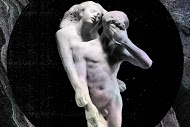With the release of their fourth studio album, Arcade Fire is back with an intense, innovative new album that proves they refuse to let their Grammy win in 2011 be the climactic moment of their success. “Reflektor” exhibits experimentation and growth, and, most excitingly, a move toward more upbeat dance tracks and a variety of new, scattered sounds. Arcade Fire adventurously steers away from their usual slow, reflective ballads and transitions to more of a dance-rock expression.
Flashback to 2011 at the 53rd Annual Grammy Awards, when Arcade Fire’s “The Suburbs” was announced as the Album of the Year: pure shock. The Twittersphere, the Internet and mainstream media exploded, and just like that, Arcade Fire became a household name for indie rock. Often when a band emerges from obscurity to mainstream, the change in audience is reflected in the music they produce. However, although “Reflektor” is a nice change of pace for the band, their true origins still shine throughout the album.
“Reflektor” is arranged into two discs, with seven songs on the first and six on the second disc. The tempo of the first seven tracks is faster-paced than the second half, and contains the breakout tracks “Reflektor,” “Here Comes The Night Time” and “Joan of Arc.” The band’s noticeable progression towards disco-pop is apparent within these tracks. The disco-dance-rock element in these songs is a different stylistic choice by the band, something we have not seen much of before.
The rest of the album starts to lull and is not very structured around forming hits, which is why it’s comparable to some of the lesser known, old material Arcade Fire has released. This isn’t necessarily a bad thing, considering the band’s success in the past due to these tracks. Tracks such as “Afterlife” and “It’s Never Over” slow down the initially fast-paced tempo of the album. The transition within the album focuses on the impressive vocals of main singers, Win Butler and Régine Chassagne.
Key producers and collaborators teamed up with Arcade Fire to make this album, most notably LCD Soundsystem frontman, James Murphy. LCD Soundsystem is a very popular alternative dance band that is known for producing excellent covers. Murphy’s influence within the album allows the band to delve into different sounds that they aren’t familiar with. David Bowie also makes an appearance on the hit track, “Reflektor,” and his vocals bring a fresh edge to the album.
After releasing three successful albums, it’s hard to live up to the hype your band has generated, and infuse a new, fresh sound into the music. Although the first three albums seem to be composed of hit after hit, “Reflektor” is less about producing hits and more about the emphasis on the music.
Although this album might not be destined for a Grammy like their last album, “Reflektor” shows how Arcade Fire isn’t afraid to change up their sound and take chances. This album is definitely worth checking out.


Leave a Reply